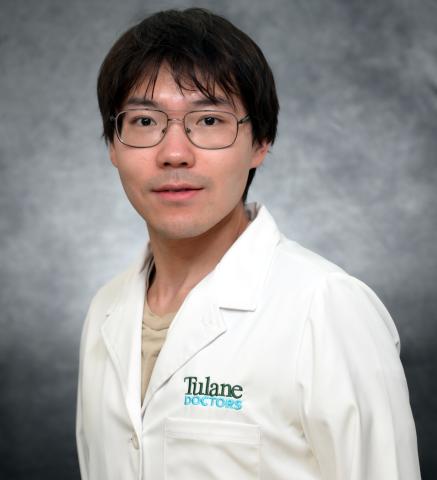Yun Gong, PhD, MD
Instructor, Biomedical Informatics & Genomics

Education & Affiliations
Biography
Yun Gong is a research instructor in the Division of Biomedical Informatics and Genomics of Tulane Center for Biomedical Informatics and Genomics (CBG), with research focusing on applying the cutting-edge single-cell multi-ome and spatial transcriptome technologies to decipher the underlying pathological mechanisms of age-related diseases (e.g., osteoporosis and Alzheimer’s Disease). Gong has an extensive background in human bone metabolism and neurology, complemented by specialized training and expertise in single-cell and spatial transcriptomic data generation on human bone and brain, computational analysis, and biological validation. Gong has achieved multiple breakthroughs in osteoporosis and Alzheimer's disease research. Accomplishments include performing the first single-cell RNA sequencing study on human osteoblasts and bone stem cells (BMSCs); constructing the first transcriptome-wide spatial atlas of human bone; and developing the first comprehensive spatial transcriptomic atlas of the human prefrontal cortex at the single-cell resolution to unveil the mechanisms of Alzheimer's disease. In summary, Gong possesses the expertise and leadership to successfully employ state-of-the-art technologies to elucidate mechanisms and identify potential therapeutic targets for various complex age-related diseases.
Contributions
U19 5U19AG055373
Hong-Wen Deng (PI), Role: research assistant
Trans-omics integration of multi-omics studies for male osteoporosis
Publications
In bone field, my publications constructed the first cell landscape on human osteoblasts and BMSCs at single-cell resolution. My research identified several novel subtypes of osteoblasts and BMSCs, along with their corresponding biological functions. Furthermore, I have identified the interactions between the osteoblasts and immune cells in human bone microenvironment. These results illustrate the underlying mechanisms of the bone metabolism and the roles of mesenchymal stem lineage cells in human immune system.
- Wang Z, Li X, Yang J, Gong Y, Zhang H, Qiu X, Liu Y, Zhou C, Chen Y, Greenbaum J, Cheng L, Hu Y, Xie J, Yang X, Li Y, Schiller MR, Chen Y, Tan L, Tang SY, Shen H, Xiao HM, Deng HW. Single-cell RNA sequencing deconvolutes the in vivo heterogeneity of human bone marrow-derived mesenchymal stem cells. Int J Biol Sci. 2021 Oct 11;17(15):4192-4206. doi: 10.7150/ijbs.61950. PMID: 34803492; PMCID: PMC8579438.
- Gong Y, Yang J, Li X, Zhou C, Chen Y, Wang Z, Qiu X, Liu Y, Zhang H, Greenbaum J, Cheng L, Hu Y, Xie J, Yang X, Li Y, Bai Y, Wang YP, Chen Y, Tan LJ, Shen H, Xiao HM, Deng HW. A systematic dissection of human primary osteoblasts in vivo at single-cell resolution. Aging (Albany NY). 2021 Aug 24;13(16):20629-20650. doi: 10.18632/aging.203452. Epub 2021 Aug 24. PMID: 34428745; PMCID: PMC8436943.
- Wang S, Gong Y, Wang Z, Meng X, Luo Z, Papasian CJ, Greenbaum J, Li Y, Liang Q, Chen Y, Li X, Xiang Q, Zhang H, Liu Y, Cheng L, Hu Y, Tan L, Shen H, Xiao H, Deng H. Regulon active landscape reveals cell development and functional state changes of human primary osteoblasts in vivo. Hum Genomics. 2023 Feb 15;17(1):11. doi: 10.1186/s40246-022-00448-2. PMID: 36793138; PMCID: PMC9930257.
- Liu Y, Chen Y, Li XH, Cao C, Zhang HX, Zhou C, Chen Y, Gong Y, Yang JX, Cheng L, Chen XD, Shen H, Xiao HM, Tan LJ, Deng HW. Dissection of Cellular Communication between Human Primary Osteoblasts and Bone Marrow Mesenchymal Stem Cells in Osteoarthritis at Single-Cell Resolution. Int J Stem Cells. 2023 Aug 30;16(3):342-355. doi: 10.15283/ijsc22101. Epub 2023 Apr 30. PMID: 37105556; PMCID: PMC10465330.
In AD field, we have developed the first comprehensive, whole transcriptome spatial transcriptome atlas of the human prefrontal cortex at the single-cell resolution. Through this valuable dataset, I have identified the distinct transcriptional alternations across six neocortex layers, highlighted the AD-associated disruptions in laminar architecture, and identified changes in layer-to-layer interactions as AD progresses.
- Gong Y, Haeri M, Zhang X, Li Y, Liu A, Wu D, Zhang Q, Jazwinski SM, Zhou X, Wang X, Jiang L, Chen YP, Yan X, Swerdlow RH, Shen H, Deng HW. Spatial Dissection of the Distinct Cellular Responses to Normal Aging and Alzheimer's Disease in Human Prefrontal Cortex at Single-Nucleus Resolution. medRxiv [Preprint]. 2024 May 22:2024.05.21.24306783. doi: 10.1101/2024.05.21.24306783. PMID: 38826275; PMCID: PMC11142279.
Awards & Accomplishments
2023 Reviewer’s Choice Abstract Award (ASHG 2023, Washington DC)
2021 Young Investigator Award (ASBMR 2021, San Diego)
